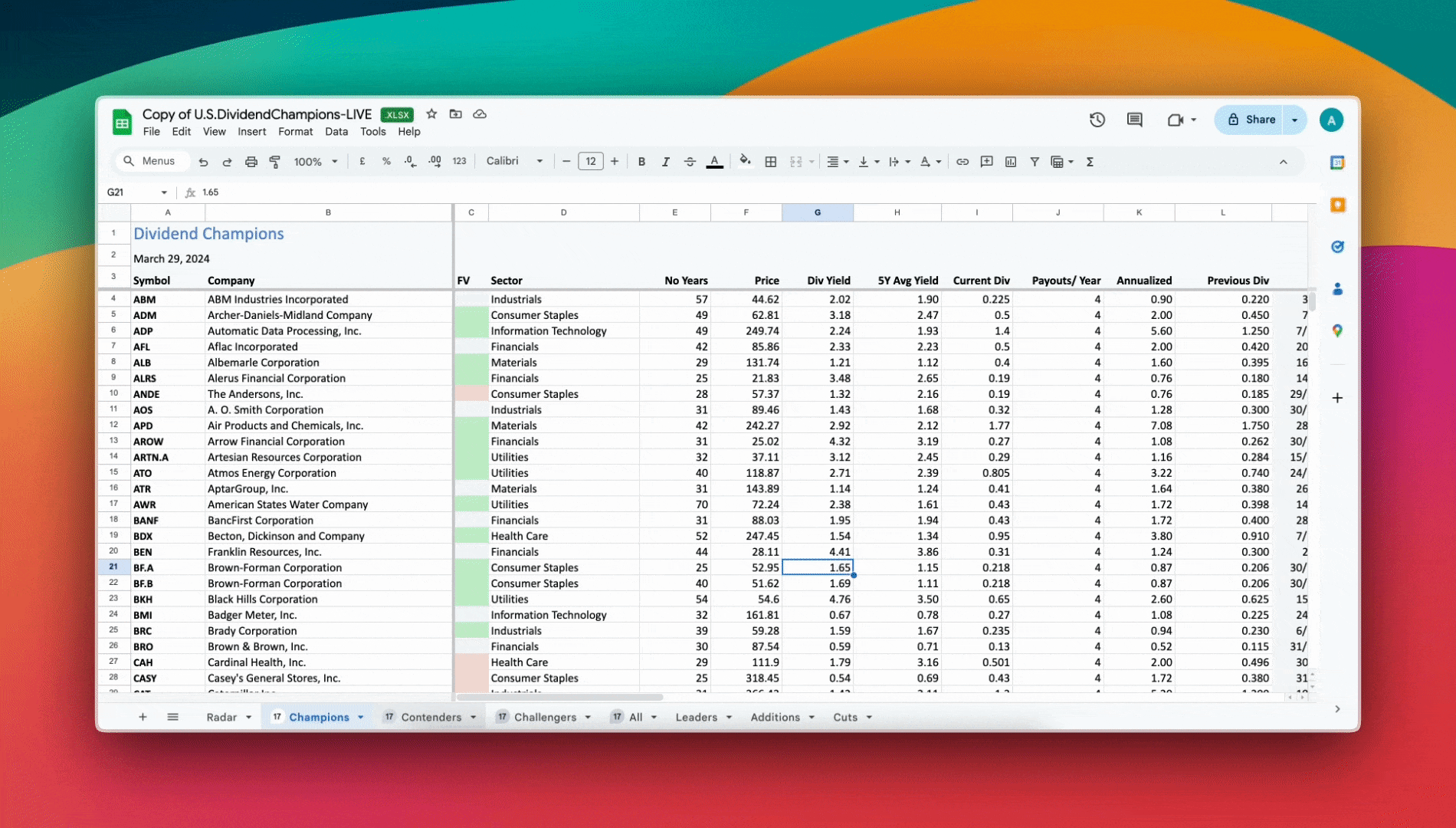This page contains Amazon Affiliate links, which help support this website.
There are numerous books devoted to the subject of dividend investing. In the coming year or so, I will offer information about many of them, though this introduction is not about a book at all.
I am embarking on an occasional series that will highlight the best books for dividend investors. I will not pull information from other articles and reprint what they have published, but will write about the books I have read and learned from them, and know will be educational to everyone with an interest in the subject.
Start with Interactive Brokers
A few years ago I was asked to be on a panel to talk about the creative process of photography. The three panel members were asked to bring a book to recommend to other photographers that would help them. My intention was to offer something that would allow the audience to learn how to go from idea to finished product, so my book was On Writing by Stephen King.
I am sure that the audience was perplexed as to why I would select a book about writing and not photography. However, I explained why the creative process was universal, and talked about how understanding a master in one discipline moves through their creative process translates to a completely different area.
That is why this introduction is not about a book, per se. If one wishes to learn then it is best to look to a master for inspiration and education.
Favorites
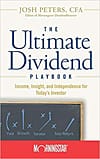
The Ultimate Dividend Playbook: Income, Insight and Independence for Today’s Investor by Josh Peters
Josh Peters, editor of the monthly Morningstar DividendInvestor newsletter, shows you why you don’t have to try to beat the market and how you can use dividends to capture the income and growth you seek.
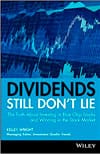
Dividends Still Don’t Lie: The Truth About Investing in Blue Chip Stocks and Winning in the Stock Market by Kelley Wright
Written by Kelley Wright, Managing Editor of Investment Quality Trends, with a new Foreword by Geraldine Weiss, this book teaches a value-based strategy to investing, one that uses a stock’s dividend yield as the primary measure of value.
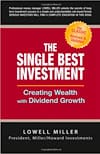
The Single Best Investment – Creating Wealth with Dividend Growth by Lowell Miller
This witty guide advises readers to stop playing the stock market or listening to television gurus and start putting their money into dividend-paying, moderate-growth companies that offer consistent returns and minimum risk.
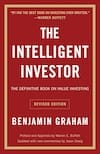
The Intelligent Investor: The Definitive Book on Value Investing by Benjamin Graham
If one is to read only one book about dividend investing, this is the book. If one is to read one hundred books about dividend investing, this is the first book to read. It is difficult to be more insistent about this. Here is my full review of The Intelligent Investor.
Suggested Reading
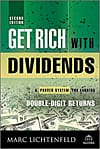
Get Rich with Dividends: A Proven System for Earning Double-Digit Returns by Marc Lichtenfeld
Get Rich with Dividends is the bestselling dividend investing book that shows investors how to achieve double digit returns using a time tested conservative strategy.
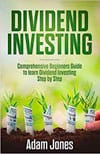
Dividend Investing: Comprehensive Beginners Guide to Learn Dividend Investing Step by Step by Adam Jones
Dividend investing isn’t some magical formula to get rich quick. It takes years to build a well-diversified portfolio that will perform well in all market environments. And it requires periodic portfolio monitoring to make sure things are running smoothly.
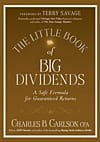
The Little Book of Big Dividends: A Safe Formula for Guaranteed Returns by Charles B. Carlson
The massive stock declines over the past year have eroded savings, but this doesn’t mean you should stuff your money under a mattress. It needs to be put to work getting some return so that it will grow. Smart investors will turn to high dividend paying stocks to get a stable and growing stream of income.

All About Dividend Investing, Second Edition by Don Schreiber
This back-to-basics book argues that dividend-paying stocks, not growth stocks, form the best foundation for any portfolio. Used strategically, dividends are your best bet for safe, profitable investing.
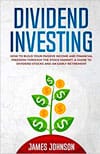
Dividend Investing: How to Build Your Passive Income and Financial Freedom Through the Stock Market by James Johnson
It’s time to learn about what dividends are, and how to start getting paid by companies that you buy shares in. In this book, you will learn the ins and outs of dividend investing from the ground up. You’ll also get some tips on what the best dividend stocks are and how to spot a dud.
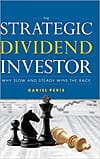
The Strategic Dividend Investor by Daniel Peris
There’s a big difference between investing in the stock market and investing in companies through the stock market. The Strategic Dividend Investor shows you why, over the long run, investing in companies with high and rising distributions is far superior to “playing the market.”
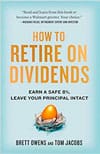
How to Retire on Dividends by Brett Owens and Tom Jacobs
You can obtain 6%, 7% and even 8% annual dividend yields–triple or even quadruple the S&P 500’s yield–without reducing principal or taking on unnecessary risk. Skip Wall Street’s low-yielding, blue-chip, “dividend aristocrat” BS and learn how from Brett and Tom!
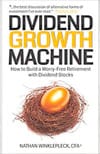
Dividend Growth Machine: How to Supercharge Your Investment Returns with Dividend Stocks by Nathan Winklepleck
In Dividend Growth Machine, investment professional Nathan Winklepleck will show you what makes dividend growth investing such a powerful investment strategy. Through easy-to-understand examples and practical tips, Nathan will show you how anyone can achieve financial independence and investment success through dividend investing.
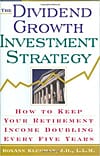
The Dividend Growth Investment Strategy: How to Keep Your Retirement Income Doubling Every Five Years by Klugman Roxann
By discussing and evaluating different investment strategies such as stocks, bonds, and mutual funds, an informative guide shows how DGIS (Dividend Growth Investment Strategy), which maximizes growth and produces income that doubles every five years, is a much better investment tactic, and includes research suggestions and materials, charts, and tables.
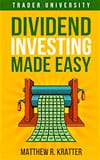
Dividend Investing Made Easy by Matthew R. Kratter
Dividend investing is a time-tested investment strategy that actually works. It’s simple, it’s powerful, and anyone can do it, even if you know nothing at all about the stock market. It’s time to learn how to create safe income streams in the stock market.
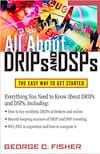
All About DRIPs and DSPs by George C. Fisher
All About DRIPs and DSPs tells investors everything they need to know about where to find direct investment opportunities.
And how to profit from their affordable compounding benefits.
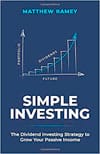
Simple Investing: The Dividend Investing Strategy by Matthew D. Ramey
Investing doesn’t have to be difficult, challenging, or overly-complex. In fact, investing can be simple. Simple Investing: The Dividend Investing Strategy to Grow Your Passive Income was written to reach those investors that are interested in learning more about how dividend investing might work for them.
Warren Buffett Letters
When it comes to investing it is hard to deny that Warren Buffett is one of the best, and recognizing what he does and why he does it is an insight into a path to success.
There are countless books about Warren Buffett – putting his name into Amazon’s search engine returns over 1,000 results. I am sure that many of them offer excellent information, but I would rather hear from the man himself, and this can be done yearly when he offers his letter to the Berkshire Hathaway shareholders in the company’s annual report.
I have been an investor in Berkshire Hathaway for the past 15 years and have read each of his letters during that time. He does talk about the company and its plans for the future, but it takes no stretch of the imagination to link how he runs the company to how one can invest prudently.
Reading his letter within the 2019 annual report offers insight into his thinking process. His initial order of business is to explain his negative view of a new GAAP rule that states that a company’s earnings needs to include unrealized gains and losses of securities. This means that each quarter their reported bottom line is subject to the vagarities of the market at that particular time.
The important take-away is that one should focus on operating earnings, as they are reflective of the success or failure of the business elements of the company. Unrealized holdings may be part of the value of the company, but they may not say much about how well or poor the company’s business is performing.
I noted a similar idea when talking about National Fuel Gas, which I started to purchase in May. Oil and gas companies are required to report an impairment charge when the book value of their future reserves exceeds its current value, so the company’s bottom-line earnings are similarly driven by the whims of the price of gas. In other words, a company can be functioning successfully, but with a drop in commodity prices, their reported earnings can be forced down. So much for depending solely upon earnings when valuing a company.
How important is the issue of retained earnings to a business? Mr. Buffett tends to feel that they can be used to great advantage and offers information to support his position.
He does so initially by taking us back to 1924 when Edgar Lawrence Smith wrote Common Stocks as Long Term Investments (currently available, with a foreword by Warren Buffett). When John Maynard Keynes reviewed the book, he said that well-run companies do not distribute all earnings to shareholders but retain a portion. He emphasized the “element of compound interest (Keynes’ italics) operating in favor of a sound industrial investment.”
Warren Buffett and Charlie Munger have successfully followed this idea, and corroboration is shown in a table listing the ten largest stock-market holdings of Berkshire Hathaway, their dividends, and retained earnings. It is an important issue for them, as he ends with, “the retained earnings of our investees are certain to be of major importance in the growth of Berkshire’s value.”
As dividend investors, this rings a familiar bell. When we receive a dividend we choose to spend or retain it. By choosing the latter and converting it to additional shares in the company the magic of compounding takes place, and those who have done it for a while appreciate its power as much as does Mr. Buffett.
He continues his letter by stating something that I was glad to hear – “we group our wide array of non-insurance businesses by size of earnings, after interest, depreciation, taxes, non-cash compensation, restructuring charges – all of those pesky, but very real, costs that CEOs and Wall Street sometimes urge investors to ignore.”
EBITA has been a bugaboo of mine for quite some time. If one is seeking to evaluate a company, why would interest and taxes not be taken into account? I know the answer (it is helpful when comparing one company to another in the same line of business), but to me this is like figuring how much income one has without taking taxes and the interest payments on one’s car into account.
These are real expenses, and when creating a budget they certainly better be part of the equation. Reading this snub by one of the most successful investors ever is a confirmation that the number may not be as important as some may believe.
The letter continues with other items, like Mr. Buffett’s expected eventual demise, how to properly select members to the Board of Directors, and under what circumstances Berkshire Hathaway will purchase their company’s stock.
The letter is a glimpse into the mind of one of the world’s most successful investors. One may not initially think that the information is relevant to them but it is in a real way. We are the guardians of our own companies, as ‘twere. One may not envision themselves in charge of a multi-billion dollar corporation, but all investors are in charge of the financial wellbeing of their futures – we are CEOs of our own company.
Many of the decisions are the same – seeing what resources are available, freeing up underperforming assets and moving them to a more productive area, determining the useful lifetime of options selected and planning for future choices, understanding what is important and what is merely masked as important, and so on.
Your portfolio is your company, and the more knowledgeable and perspicacious one can be about every element within that company will lead to a more successful conclusion, and that is what investing is all about.
Sitting at the heels of the best at something and soaking in everything they have to offer is not only a proper step, but is part of the continual journey we make in an attempt to improve. Walking through Warren Buffett’s letters to the shareholders is a giant step in that journey.
Additional Recommendations of Interest to Dividend Investors
- Buying Stocks Without A Broker by Charles B. Carlson
- Smart Investors Keep It Simple: Creating Passive Income with Dividend Stocks by Giovanni Rigters
- The Great American Dividend Machine: How an Outsider Became the Undisputed Champ of Wall Street by Bill Spetrino
- Shareholder Yield: A Better Approach to Dividend Investing by Mebane Faber
- Investing for Beginners: A Short Read on the Basics of Investing and Dividends by James Moore
- Step by Step Dividend Investing: A Beginner’s Guide to the Best Dividend Stocks and Income Investments by Joseph Hogue
- The Dividend Mantra Way: Achieving Financial Independence By Living Below Your Means And Investing In Dividend Growth Stocks by Jason Fieber
- The Little Book of Big Dividends: A Safe Formula for Guaranteed Returns by Charles B. Carlson
- The Ultimate Dividend Playbook: Income, Insight and Independence for Today’s Investor by Josh Peters
- The Snowball Effect: Using Dividend & Interest Reinvestment to Help You Retire on Time by Timothy J McIntosh
- Dividend Stocks For Dummies by Lawrence Carrel
- Dividend Investing: A Beginner’s Guide for Income Growth Finding your Way to Financial Freedom
As an Amazon Associate, qualifying purchases help support this website.
